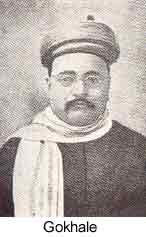

 |  |
 By 1907, the Moderate nationalists had exhausted their historical role. Their achievements, were immense, considering the low level of political consciousness and the immense difficulties they had to face when they began. By 1907, the Moderate nationalists had exhausted their historical role. Their achievements, were immense, considering the low level of political consciousness and the immense difficulties they had to face when they began.Their failures too were numerous. They lacked faith in the common people, did not work among them and consequently failed to acquire any roots among them. Even their propaganda did not reach them. Nor did they organize any all-India campaigns and when, during 1905-07, such an all-India campaign did come up in the form of the Swadeshi and Boycott Movement, they were not its leaders. Their politics was based on the assumption that they would be able to persuade the rulers to introduce economic and political reforms but their practical achievement in this field was meager. Instead of respecting them for their moderation British treated them with contempt. The Government of India, headed by Lord Minto as Viceroy and John Morley as the Secretary of State, offered a bait of fresh reforms in the Legislative Councils and in the beginning of 1906 began discussing them with the moderate leadership of the Congress. The Moderates agreed to cooperate with the Government and discuss reforms even while a vigorous popular movement, which the Government was trying to suppress, was going on in the country. The result was a total split in the nationalist ranks. There was a great deal of public debate and disagreement among Moderates and Extremists in the years 1905-1907, even when they were working together against the partition of Bengal. The Extremists wanted to extend the movement from Bengal to all over the country. They also wanted to extend the boycott of foreign goods to eventually all kinds of association with the colonial rulers. The Moderates were opposed to all these ideas. Matters nearly came to a head at the Calcutta Congress in 1906 over the question of its Presidentship. A split was avoided by choosing Dadabhai Naoroji, who was respected by all the nationalists as a great patriot. Four compromise resolutions on the Swadeshi, Boycott, National Education and Self-Government demands were passed. Throughout 1907 the two sides fought over different interpretations of the four resolutions. By the end of 1907, they were looking over eachother as their main political enemy. next page >> |
Copyright ©2000 indiansaga.info. All rights reserved.
By using this service, you accept that you won't copy or use the data given in this website for any commercial purpose.
The material on indiansaga.info is for informational & educational purpose only.
This site is best viewed at 800 X 600 picture resolution.